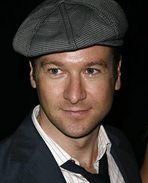SITE GUIDE
SEARCH
REVIEWS
REVIEW ARCHIVES
ADVERTISING AT CURTAINUP
FEATURES
NEWS
Etcetera and
Short Term Listings
LISTINGS
Broadway
Off-Broadway
NYC Restaurants
BOOKS and CDs
OTHER PLACES
Berkshires
London
California
New Jersey
DC
Philadelphia
Elsewhere
QUOTES
TKTS
PLAYWRIGHTS' ALBUMS
LETTERS TO EDITOR
FILM
LINKS
MISCELLANEOUS
Free Updates
Masthead
Writing for Us
A CurtainUp  London Review
London Review
 London Review
London ReviewObserve the Sons of Ulster Marching Towards the Somme
| A war of the elect upon the damned.— Kenneth Pyper
|

Billy Carter as Christopher Roulston (Photo: Robert Day) |
It is of course a play about male bonding and the extremity of religious views in Northern Ireland and all the more remarkable for being written by McGuinness who hails from the Irish Republic. The play starts with the regretful and embittered old man looking back. Kenneth Pyper is one of McGuinness' great creations. He is a misfit, an oddball. As an old man he sees the ghosts of his fallen comrades, the seven who didn't survive in a striking monologue of Pyper warring against the world. He is joined by three men in khaki greatcoats, silent and impassively looking on.
As Richard Dormer takes on the role, the younger, eccentric Pyper with his affluent and privileged background meets David Craig (Eugene O'Hare) and manages to find common ground. They are both joining the army although the enemy seems to be more the Fenians, the Irish nationalists, than the Hun. They are joined by Christopher Roulston, (an impressive Billy Carter) who is a preacher as uptight as his hair parted and slicked onto his head, with horn rimmed glasses and a stiff collar and tie. Roulston is mocked by Pyper who knows him from school. Michael Legge plays Martin Crawford, the wide eyed youngster whom Roulston takes under his wing.
It is a showcase role for Dormer as the younger Pyper as he starts his part of the play as a know it all, an unpleasantly mocking character who's more at home in a lunatic asylum than in the army—someone to whom only an insane person would give a rifle. But he shows bravery when he tackles the Protestant bullies head on when they threaten Crawford, whom they suspect to be a Catholic. By the end of the war action in the play, Pyper has shown his ability to be a member of a group and the scene when they all, almost ceremonially, place each other's Orange sashes over their soldier's uniforms is a touching statement of acceptance of the misfit, Pyper. He has earned his place in the hearts of the men and of the audience. Also admirable is the sincerity of Billy Carter's Christopher Roulston who questions his faith and finds humanity with Martin Crawford.
Michael Taylor's design and costumes are authentic as the men bandage their trouser legs with khaki bandages and the lighting helps create the atmosphere of the trenches beneath the barbed wire and iron stakes at ground level. The Northern Irish accents are perfect too as many of the actors are themselves Ulstermen.
Wars may be caused by conflict and hate but ironically fighting seems to bring the men together. Act Two of McGuinness' play is a lyrical series of snapshots of home leave where the men meet a comrade in a civilian setting. Back in the trenches, the play recreates the 1690 Battle of the Boyne. The victory of William of Orange, later William III, over James II is acted out astride human horses but has an unexpected result as the Catholic monarch triumphs, perhaps an ill omen of the battle to come. The July 1st 1916 Battle of the Somme where so many Ulstermen died is the exact anniversary of the Battle of the Boyne, two hundred and twenty six years earlier.
Mc Guinness' play strikes me as less about the First World War than the men of Ulster. There are no casualties to trench foot, or shell shock or gas, none who want to run away, just men doing their best in an impossible situation with dreadful human carnage the result.
For the review by Elyse Sommer in New York and for more plot details go here Observe the Sons of Ulster Marching Towards the Somme .
| Observe the Sons of Ulster Marching Towards the Somme
Written by Frank McGuinness Directed by John Dove Starring: James Hayes, Richard Dormer, Billy Carter With: Eugene O'Hare, John Hollingworth, Mark Holgate, Michael Legge, Owen Sharpe, Chris Garner Design: Michael Taylor Lighting: Mick Hughes Sound: Simon Baker Composer: Claire van Kampen Running time: Two hours 15 minutes with an interval Box Office: 020 7722 9301 Booking to 18th July 2009 Reviewed by Lizzie Loveridge based on 23rd June 2009 performance at the Hampstead Theatre, Eton Avenue, London NW3 (Tube: Swiss Cottage) |
|
REVIEW FEEDBACK Highlight one of the responses below and click "copy" or"CTRL+C"
Paste the highlighted text into the subject line (CTRL+ V): Feel free to add detailed comments in the body of the email . . . also the names and emails of any friends to whom you'd like us to forward a copy of this review. |
|
London Theatre Tickets Lion King Tickets Billy Elliot Tickets Mighty Boosh Tickets Mamma Mia Tickets We Will Rock You Tickets Theatre Tickets |




